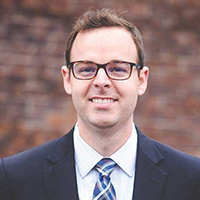Emerson Estate Lawyer, Iowa
Scott Miller Thorson
✓ VERIFIEDAccident & Injury, Criminal, Workers' Compensation, Estate
Scott Thorson grew up in Omaha, Nebraska, and attended Nebraska Wesleyan University, where he graduated in 2008. Mr. Thorson received his legal traini... (more)
Jamie L. Cox
✓ VERIFIEDAccident & Injury, Employment, Estate, Real Estate, Civil & Human Rights
Jamie L. Cox is a partner at Willson & Pechacek, PLC, in Council Bluffs, Iowa. Mr. Cox’s general litigation practice focuses on personal injury law,... (more)
FREE CONSULTATION
CONTACTRick C. Kimble
Commercial Real Estate, Real Estate, Estate, Corporate, Business
Status: In Good Standing
Jack E. Ruesch
Real Estate, Wills & Probate, Corporate, Business Organization, Bankruptcy
Status: In Good Standing
Charles Kenneth Whitacre
Criminal, Personal Injury, Estate, Real Estate
Status: In Good Standing Licensed: 47 Years
Walt Thomas
Accident & Injury, Estate, Workers' Compensation, Bankruptcy & Debt
Status: In Good Standing
Jenna Joy Seibeck
Credit & Debt, Natural Resources, Gift Taxation, Bankruptcy
Status: In Good Standing



